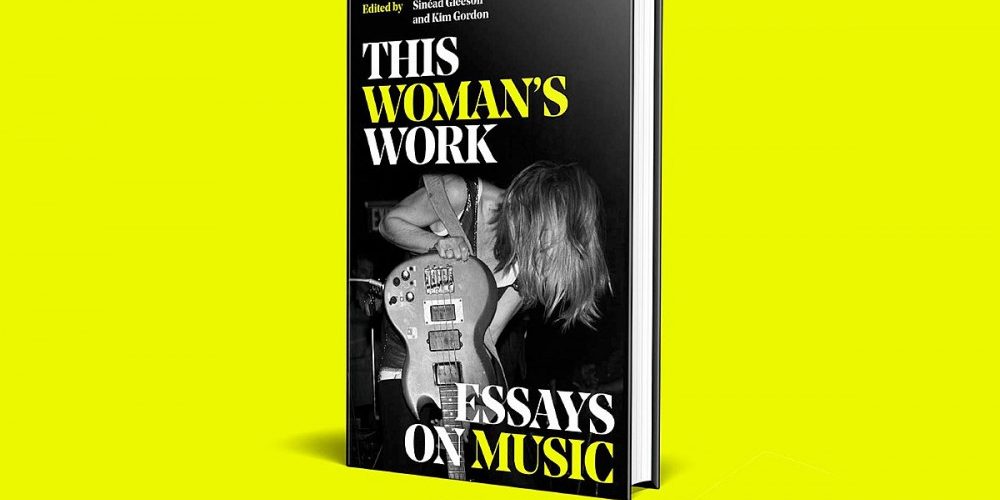Kim Gordon co-editing book of music essays, ‘This Woman’s Work’
Kim Gordon is one of the editors of a new collection of music writing. She and Sinéad Gleeson have announced This Woman's Work: Essays On Music, due out April 7 via White Rabbit. It collects pieces from 18 women writers, including Ottessa Moshfegh, Juliana Huxtable, Liz and Jenn Pelly, Maggie Nelson, Anne Enright, Fatima Bhutto, Margo Jefferson, and more, and here's the synopsis:
This is a collection of essays by between 18 female writers, writing about exclusively female experiences in music. The instrument makers, the experimentalists, the harmonisers, the avant-garde, the genre-breakers, the pop queens, those on the margins who expose the lack of intersectionality in this industry.
For a long time, the narrative of music has been male-centred and hyper-masculine. The purpose of women within it was to orbit these men: swooning to Elvis, screaming en-masse at Beatles gigs, or trying to get backstage to sleep with the rock bad boys. When women gained visibility in the music of the 1960s, they were – again – allocated specific tropes: backing singer, lone woman in the band, Motown trios singing innocuous love songs. In the 1970s, at the time Kate Bush became the first woman (at just 17) to have a number one with song she'd written herself, the women of punk began to make their voices heard. But many didn't like these acts of assertion; the femaleness, the raging against gender stereotypes, the Amazonian loudness of it all. Joan Jett recalls being knocked over on stage by flying bottles; The Slits were chased and threatened after gigs and their singer Ari Up was stabbed twice. In the 1980s, as hip hop gained prominence, it made room for only a handful of women, while trading in misogynist rhymes, where women could only be hoes, bitches or gold diggers. How were young female rappers of colour to participate when they didn't see themselves represented in that culture? Canons – in literature, film, music – can point relentlessly towards a male compass and women within them can be othered, or exoticised – OR they attempt to own it. To speak up. To shout louder.
But sexism is hard-coded in this industry. The term 'A&R man' was an industry standard for years, despite its lack of inclusivity. And what of production greats like Eno, Martin, Quincy Jones? – there is no female producer with that level of name recognition, and this problem is what's at the core of this book. Why the valorisation of men who play music? Why the gendered cul-de-sacs that leaves women marginalised and adrift? Why the constant attempts to be taken seriously as a guitarist, desk engineer or lyricist? There are thousands of women in music whose stories we don't know. Pioneers whose achievements are undervalued, often by virtue of their gender, or because someone else (a man?) took credit for it.
Things change. Planets shift. There is more acceptance now, conversely, in a world that is currently seeing rowbacks on feminism, equality and politics. We need to remember the stories of the past, the women who shattered ceilings and kicked in doors, while we lean into a future of new names, new movements, and new ways of thinking about the vast spectrum of women in music.
On Instagram, Kim writes, "'What’s it like to be a girl in a band?' The often-repeated question throughout my career as a musician made me feel disrupted, a freak or that we are all the same. I once asked my boyfriend what it was like to have a penis? To me they are sort of equivalent questions. If it was born out of pure curiosity it’s understandable. Hopefully this book begins an unravelling of the myth that if you’re a female musician you are a ready-made, easily digestible. I loved working with Sinéad on this book – she is a true inspiration! And so thrilled to be working with Lee Brackstone again."
"Music has been a massive part of my life, from fan to music journalist and writer, I’ve always been aware that male narratives have dominated this industry; valorised and prioritised above many ground-breaking female practitioners," Sinéad writes. "Women (like Kim) had to carve out their own space within it, and we wanted to create a book that asked women to tell us about the female artists, movements and pioneers that matter to them. It’s been honour to find these stories, and to work alongside Kim—who I first saw play in Dublin with Sonic Youth when I was 16. This Woman's Work has a stellar list of contributors writing across subjects both familiar and niche and we hope there's something in here for every music fan."
See the full list of contributors below.
This Women's Work Contributors:
1. Kim Gordon
2. Sinead Gleeson
3. Ottessa Moshfegh
4. Juliana Huxtable
5. Maggie Nelson
6. Rachel Kushner
7. Anne Enright
8. Yiyun Li
9. Dee Barnes
10. Leslie Jamison
11. Emma Dabiri
12. Fatima Bhutto
13. Liz Pelly
14. Jenn Pelly
15. Megan Jasper
16. Simone White
17. Margo Jefferson
18. Zakia Sewell
